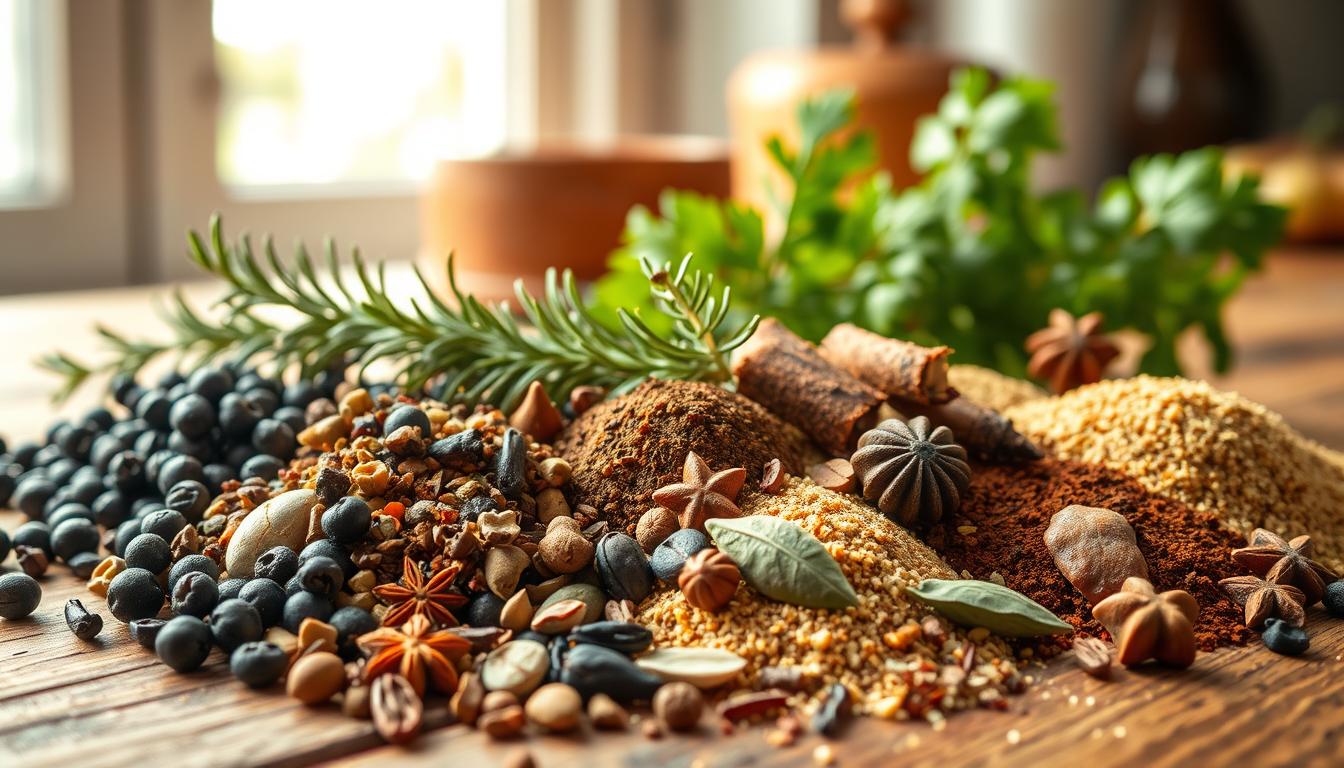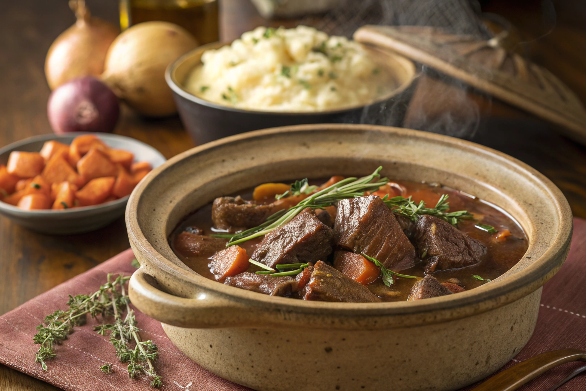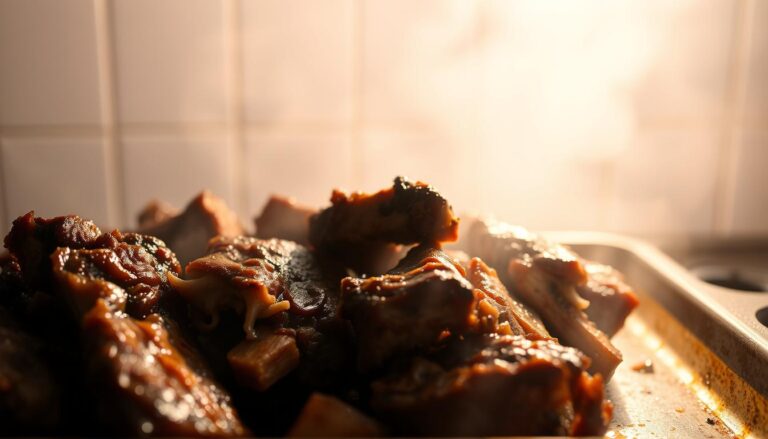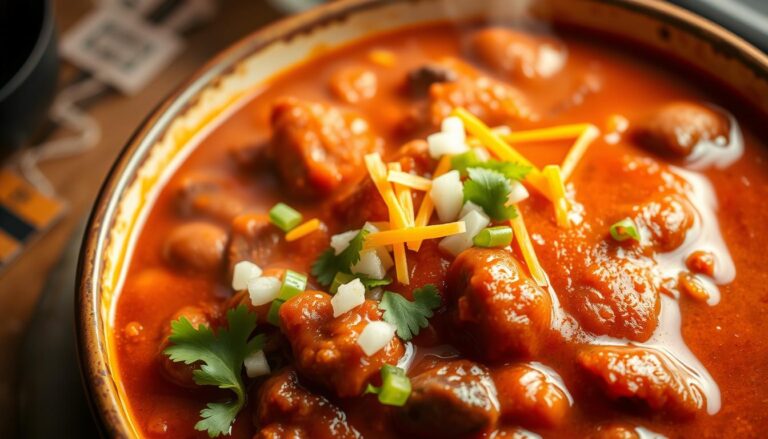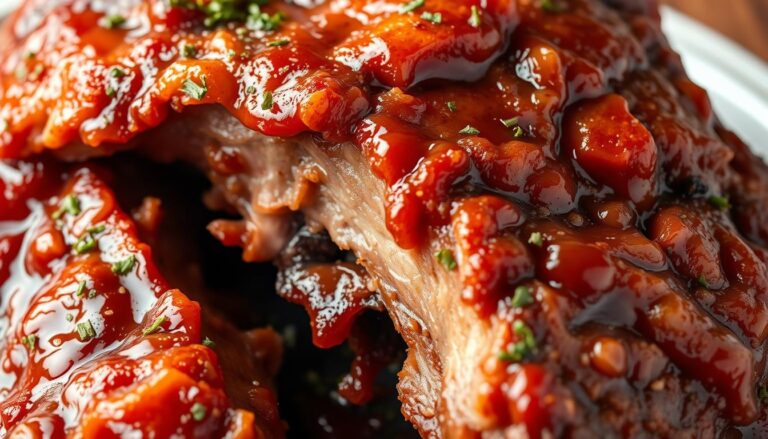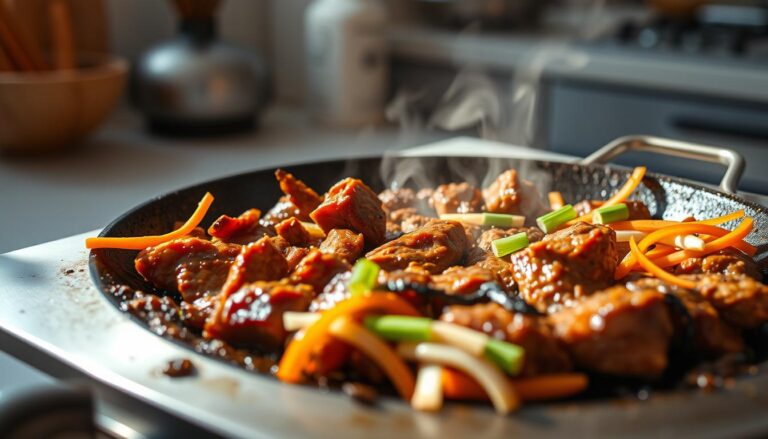Find the top corned beef spices to make your meals more exciting. The right spice mix is crucial for a good corned beef taste. It balances saltiness and warmth perfectly.
Using the best spices makes your dishes unforgettable. Whether you stick to classic recipes or try new ones, the right spices will make a difference.
Great spice blends include peppercorns, mustard seeds, and bay leaves. These ingredients boost the meat’s flavor. The right combination can transform ordinary meat into a flavorful delight.
When choosing spices, think about how they add to the dish’s umami. The best spices are more than just seasonings. They are a way to express your creativity in cooking.
Table of Contents
Why Corned Beef Spices Are Essential for Flavor
Great corned beef isn’t just about the meat—it’s the spices that make it special. Each spice in your blend adds to the texture, aroma, and taste. Let’s see how these ingredients change your cooking.
Understanding the Role of Spices
Spices in corned beef spices are more than just extras—they shape the flavor. Here are some important ones:
- Peppercorns: Add heat and depth.
- Mustard seeds: Bring tanginess and aroma.
- Bay leaves: Balance with subtle herb notes.
| Spice | Flavor Contribution | Traditional Use |
|---|---|---|
| Juniper berries | Earthy undertones | Classic in Irish corned beef recipes |
| Cloves | Warmth and complexity | Used in American-style brisket |
The Impact on Your Cooking Experience
“A well-balanced spice blend is the backbone of any great corned beef dish.” — Chef Maria Torres, Smoke & Spice Journal
Quality corned beef spices save time and effort. Pre-measured blends like McCormick’s Classic Brisket Seasoning make meal prep easier. They also:
- Enhance meat tenderness by breaking down fibers.
- Create layered flavors that pair well with sides like cabbage or potatoes.
- Reduce guesswork, letting you focus on cooking techniques.
Choosing the right corned beef spices makes every meal better. It helps both new and experienced cooks achieve restaurant-quality flavor.
History and Tradition of Corned Beef Spices
Traditional corned beef spices have been a key part of cooking for centuries. They started in Ireland and Northern Europe, born from need and creativity. Before refrigeration, salt and spices like peppercorns and bay leaves kept meat fresh and tasty. These traditional corned beef spices became symbols of culture, passed down through generations.
Irish immigrants brought these recipes to the U.S. in the 1800s, using local ingredients. New York City butchers mixed traditional spices with mustard seeds and juniper berries. This created the bold flavors we see in today’s pastrami-style blends. Each spice has its own story—peppercorns for warmth, bay leaves for depth.
“The best corned beef spices are a bridge between past and present,” explains a culinary historian. “They remind us that flavor is tied to history.”
Today, cooks can make these timeless blends again. Traditional corned beef spices use simple, meaningful ingredients. Peppercorns, mustard seeds, and coriander are at the heart of many historic recipes. By exploring these traditions, we learn about the role of flavor and preservation in our diets.
Today, chefs around the world pay tribute to this heritage. Using traditional corned beef spices connects us to centuries of culinary innovation. Whether for St. Patrick’s Day or a family recipe, these spices carry stories of migration, adaptation, and cultural pride.
Homemade Corned Beef Spices: Tips for Crafting Your Blend
Learning to make homemade corned beef spices is all about blending flavors right. Whether you’re new to cooking or have lots of experience, these tips will help your spice blend stand out.
Selecting High-Quality Ingredients
Choose whole spices for the best flavor. Go for whole peppercorns, mustard seeds, and bay leaves. Steer clear of pre-ground spices to keep your blend fresh. Using fresh ingredients will make a big difference in your homemade spice mix.
- Peppercorns for heat
- Mustard seeds for tang
- Cloves for warmth
Step-by-Step Guide for Your Own Spice Mix
- Grind peppercorns and mustard seeds in a spice grinder.
- Mix 2 tablespoons of each ground spice with 1 teaspoon of coriander and ½ teaspoon of blackstrap molasses powder.
- Keep it in an airtight container, away from light.
Adjusting Flavors to Suit Your Taste
“Taste as you go—small adjustments make big flavor differences.”
Try adding smoked paprika for a smoky taste or less salt for a milder flavor. Keep track of your changes to make your homemade corned beef spices even better with each batch.
Traditional Corned Beef Spice Blends for Authentic Flavor
Discover how authentic corned beef spices connect your meals to culinary heritage. Traditional recipes often rely on combinations refined over centuries, ensuring depth and consistency. These blends balance salt, pepper, and herbs to preserve meat while enhancing taste.
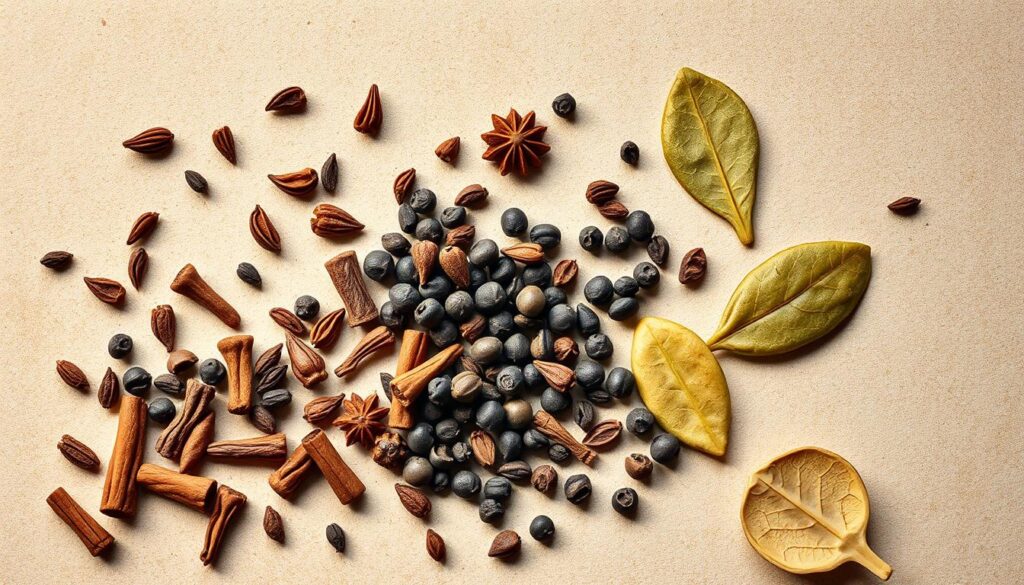
Classic blends vary by culture. Irish styles emphasize juniper berries and mustard seeds, while Jewish traditions use cloves and allspice. These ingredients create regional identities that define dishes like corned beef and cabbage or pastrami.
| Tradition | Core Spices | Origin |
|---|---|---|
| Irish | Peppercorns, juniper, bay leaves | Ireland |
| New York Jewish | Cloves, coriander, allspice | USA |
| Classic American | Salt, black pepper, mustard seeds | USA |
Experiment with these blends to match your palette. Look for labels highlighting authentic corned beef spices to ensure traditional ratios. Pairing the right blend with cooking methods unlocks flavors generations have cherished.
Expert Reviews: Top-Rated Corned Beef Spices
Choosing the best corned beef spices can be tough. Expert reviews and user feedback make it easier. They help find the best blends in taste and quality.
What Makes a Spice Blend Top-Rated
Experts look at three main things when rating corned beef spices:
- Flavor balance: A mix of peppercorns, mustard seed, and allspice that avoids overpowering any single note.
- Ingredient quality: Premium spices with no artificial additives.
- Consistency: Works well in slow-cooked dishes or quick preparations.
User Testimonials and Ratings
“Old London’s corned beef seasoning adds authentic smokiness every time—I’ve used it for years.”
Users love Penzeys Corned Beef Rub for its strong flavor and versatility. They say it’s easy to use and always gives great results. Many praise how it makes cooking at home feel like a restaurant experience.
Look at ratings from cooking forums or online stores to find the best corned beef spices. Choose blends that use natural ingredients and have clear flavors.
Premium Corned Beef Spices: A Closer Look at Ingredients
Choosing premium corned beef spices means every ingredient counts. These mixes blend science and tradition for top flavor. See how natural parts come together to make your meals better.
Key Ingredients and Their Benefits
Top-tier blends use:
- Coarse black peppercorns – add sharp, lasting heat
- Dried mustard seeds – contribute tangyness and aroma
- Coriander – provides earthy undertones
- Sea salt – balances flavors and enhances moisture retention
The Science Behind Flavor Enhancement
Mustard seeds have glucosinolates, which release sharpness when crushed. Peppercorns’ piperine makes heat more intense. When cooked, coriander’s heat unlocks essential oils, adding depth to meat.
Salt pulls out natural juices, helping spices stick to the meat. This mix ensures every bite is full of balanced flavors.
Flavorful Corned Beef Spices: Balancing Your Blend
Getting the right mix of flavorful corned beef spices is crucial. Too much of one spice can ruin the dish, making others hard to taste. Start by adding spices carefully, so each one can be enjoyed.
- Begin with a base: Combine peppercorns, mustard seeds, and coriander for a foundation.
- Add salt and sugar in small increments to balance saltiness and sweetness without dominance.
- Incorporate a pinch of paprika for color and subtle smokiness, but avoid overusing it.
- Test blends by tasting small batches before applying to meat.
Adjust the spice mix slowly. If it’s too bland, add a bit of black pepper. If it’s too sharp, try some allspice for warmth. Make small changes to avoid big mistakes. The aim is to create a dish where every spice works together well.
Using Corned Beef Spices: Cooking Techniques and Tricks
Learning the right cooking methods can make a big difference. Whether you use store-bought or homemade spices, how you apply them matters. This ensures every bite is full of flavor.
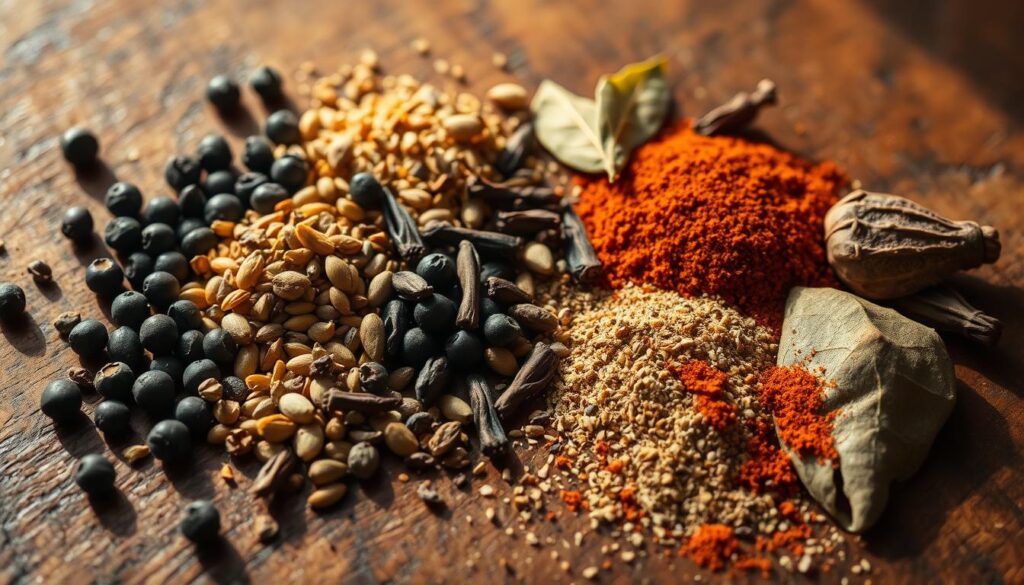
Infusing Spices into Your Meat
- Apply a dry rub by evenly coating raw meat with your spice blend for corned beef before cooking.
- Create a brine by dissolving spices in water and refrigerating meat for 12–24 hours for deep flavor penetration.
- Inject marinades directly into the meat using a syringe for even distribution.
Marinating and Slow-Cooking Tips
Slow cooking makes the spice blend’s aroma even better:
- Marinate for at least 2 hours, but overnight for best results.
- Cook at 275°F in a slow cooker or oven to let flavors meld gradually.
- Flip the meat occasionally to ensure even seasoning.
Pairing Spices with Complementary Flavors
Make your dish even better by matching your spice blend with sides:
- Cabbage and potatoes absorb smoky or peppery notes.
- Pair bold blends with tangy mustard-based sauces.
- Try a spice blend for corned beef with honey-glazed carrots for a sweet-savory balance.
“The best corned beef recipes balance spice intensity with cooking time.”
How to Choose the Right Corned Beef Spices
Choosing the right spices is key to a flavorful corned beef. Follow these steps to find the perfect blend for you.
First, think about what you want in your spice mix. Here’s how to narrow down your choices:
Identifying Your Flavor Profile
Ask yourself these questions to find your flavor:
- Do you like bold, smoky flavors or something milder?
- Are you into classic recipes or something new?
- Do you want something easy or like to get creative?
Comparing Store-Bought and Homemade Options
Consider these points when choosing between pre-made blends and making your own:
Store-Bought:
- It’s quick and easy
- Brands like McCormick or Morton’s have tested mixes
- It might have preservatives or set flavors
Homemade:
- You can adjust the flavors to your liking
- Whole spices give a stronger scent
- It takes time to measure and mix
Corned Beef Spices and Dietary Considerations
Knowing what’s in your spice blend is key to managing your diet. Many mixes have common allergens like mustard seeds or garlic. Always check labels to avoid ingredients that could trigger reactions.
For those watching sodium, look for low-sodium blends. Or, reduce store-bought mixes with homemade versions.
Some mixes have sugar or artificial preservatives. Choose organic or all-natural options to avoid additives. If you’re cutting sodium, try substituting half the salt with herbs like thyme or rosemary. Here’s how to adjust safely:
- Check for mustard powder or soybean oil in ingredient lists
- Compare sodium levels between brands
- Use fresh herbs to boost flavor without salt
Pairing spices with nutrient-rich sides like roasted vegetables balances meals. Always check nutrition facts to align with your health goals. Small tweaks let you enjoy bold flavors while maintaining wellness priorities.
Conclusion
Choosing the right corned beef spices can make any meal special. Whether you use traditional blends or make your own, quality matters. Fresh ingredients and balanced seasoning are key.
Don’t be afraid to try new things. Adjusting spice amounts or adding sides can make a big difference. Whether you’re cooking brisket or marinating, the right spices enhance both taste and texture.
Think about what you like: smoky, savory, or a mix. Look at reviews and ingredients to pick the best store-bought options. Then, tweak them to your liking with homemade touches. With time, you’ll get the perfect balance of spices for your corned beef.
Starting your cooking journey is exciting. Try new spice mixes, share recipes, or explore classic dishes. Each step helps you create meals that are both delicious and meaningful. The right spices are more than just flavor; they’re the heart of your dish.

